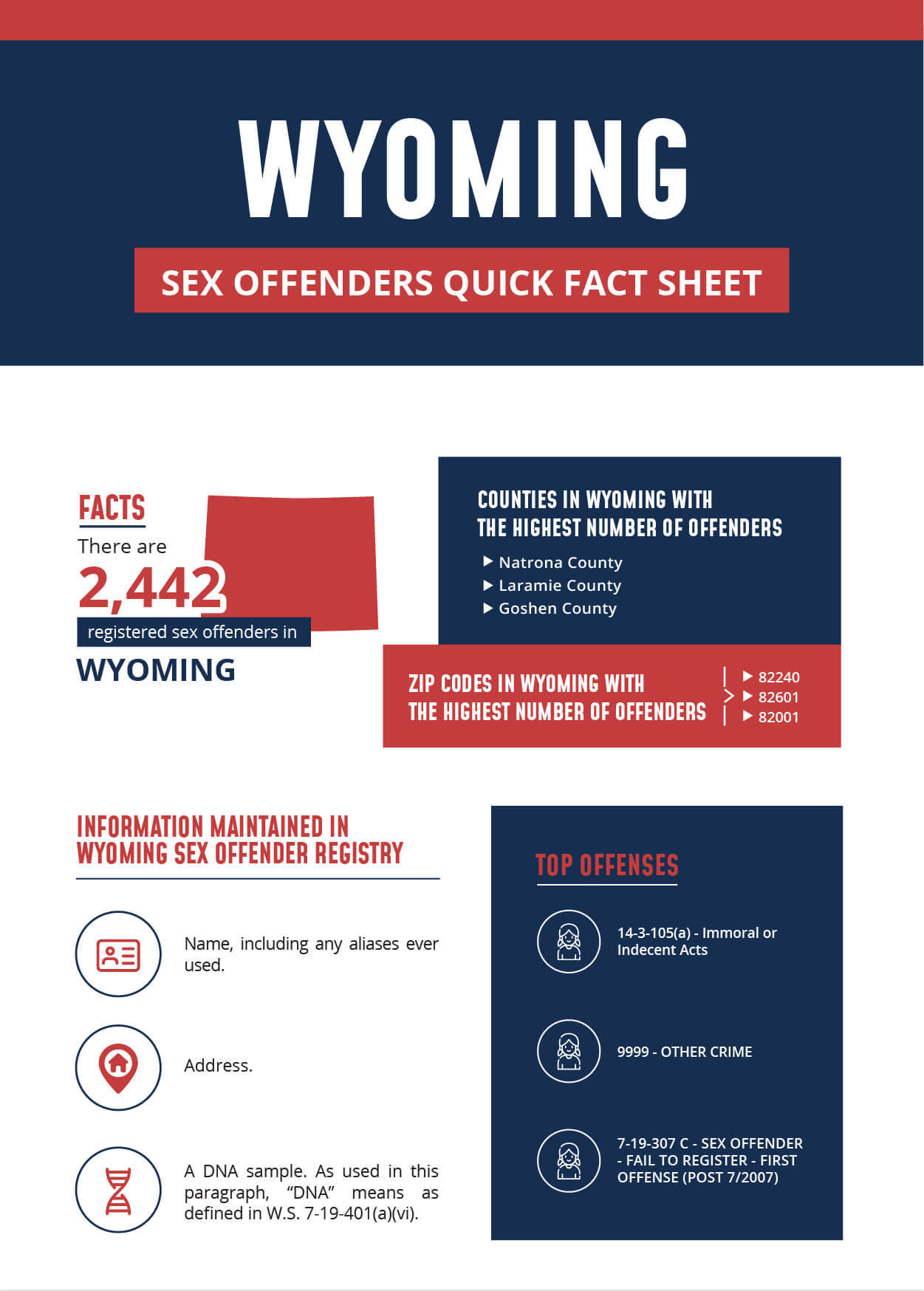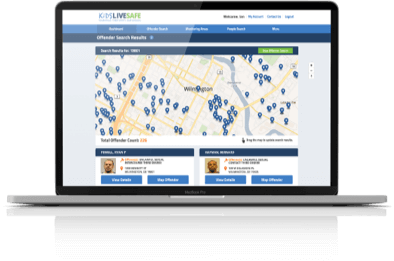Wyoming’s sex offender law ensures that all offenders in the state register at their local sheriff’s office.
The law protects residents of Wyoming by keeping an eye on convicted sex offenders living in their community. Local sheriffs in the state regularly conduct random compliance checks on sex offenders in their community.
An offender in Wyoming must notify the local authorities when there is any change to his/her registered information.
The law also makes provision for community notification. Residents of the state are informed whenever a sex offender living in their community gets out of jail.
Information on sex offenders in Wyoming is released on the internet through the state’s registry.
There is no law restricting where an offender may live or work in Wyoming. However, sex offenders are not allowed to live 1000 feet within a school or childcare facility.
Sex Offenders are not allowed to be in a school during, or within 30 minutes of, a planned school program. They are also not allowed to loiter within 1000 feet of a school.
Identify Nearby Sex Offenders in Wyoming ⮕
Wyoming Sex Offender Registry
Wyoming Sex Offender’s registry manages all information on convicted sex offenders living in the state. The registry conducts regular verification to ensure that all registered information is accurate. Residents of Wyoming can access this information through the registry’s official website on the internet.
How Well do You Know the People in Your Child's Life?
Get a Background Report in minutes.
Wyoming Sex Offender Infographic

Learn and share vital facts and figures about Wyoming sex offenders with this convenient infographic.
View Wyoming Sexual Predator Infographic
Wyoming Sex Offender Facts
Facts
- There are 2,618 registered sex offenders in Wyoming as of 12/13/2021.
Top Offenses
- 14-3-105(a) - Immoral or Indecent Acts
- 9999 - OTHER CRIME
- 6-2-315(A)(I) - SEXUAL ABUSE OF A MINOR IN THE SECOND DEGREE-actor >= 17 / victim 13-15 & <= 4 yrs. younger / sexual intrusion
- 7-19-307 C - SEX OFFENDER - FAIL TO REGISTER - FIRST OFFENSE (POST 7/2007)
- 6-2-302(a)(i) - Sexual Assault in 1st Degree-with intrusion
Counties in Wyoming with the highest number of offenders:
- Natrona County
- Laramie County
- Goshen County
- Campbell County
- Carbon County
Zip Codes in Wyoming with the highest number of offenders:
Nearby States:
Wyoming Sex Crimes Requiring Offender Registration
- Sexual assault (1st degree) - WYO. STAT. ANN. § 6-2-302.
- Sexual assault (2nd degree) - WYO. STAT. ANN. § 6-2-303.
- Sexual assault (3rd degree) - WYO. STAT. ANN. § 6-2-304(a)(i) or (a)(ii).
- Sexual assault (3rd degree), if the victim is under 16 - WYO. STAT. ANN. § 6-2-304(a)(iii).
- Incest - WYO. STAT. ANN. § 6-4-402.
- Immoral or indecent acts, when the victim is under the age of 16 and the offender was at least four (4) years older than the victim - WYO. STAT. ANN. § 14-3-105.
- Conspiracy to commit sexual assault as defined in WYO. STAT. ANN. § 6-2-301(a)(v).
- Indecent liberties, provided the victim was at least 16 years old and less than 18 years old, and the offender is at least 4 years older than the victim - WYO. STAT. ANN. § 14-3-105.
Criminal Offenses Against Minors - all offenses committed against victim under the age of 18:
- Kidnapping - WYO. STAT. ANN. § 6-2-201.
- Felonious restraint - WYO. STAT. ANN. § 6-2-202.
- False imprisonment - WYO. STAT. ANN. § 6-2-203.
- Prostitution - WYO. STAT. ANN. § 6-4-101.
- Soliciting a prostitute - WYO. STAT. ANN. § 6-4-102.
- Promoting prostitution - WYO. STAT. ANN. § 6-4-103.
- Promoting obscenity involving the use of minor in a sexual performance - WYO. STAT. ANN. § 6-4-302
- Soliciting sexual relations with a minor - WYO. STAT. ANN. § 14-3-104.
- Sexual exploitation of children - WYO. STAT. ANN. § 6-4-303.
- The attempt to commit any of the above listed offenses.
- Any offense committed in another jurisdiction, including a federal court or courts martial, which, if committed in this state, would constitute a registrable offense.
Information maintained in Wyoming Sex Offender Registry
W.S. 1977 § 7-19-302
(a) Any offender residing in this state or entering this state for the purpose of residing in this state shall register with the division of criminal investigation or other entity in accordance with the provisions of this act. The offender shall be photographed, fingerprinted and palmprinted by the registering entity or another law enforcement agency and shall provide the following additional information when registering:
- Name, including any aliases ever used;
- Address;
- Date and place of birth;
- Social security number;
- Place of employment;
- Date and place of conviction;
- Crime for which convicted;
- The name and location of each educational institution in this state at which the person is employed or attending school; (ix) The license plate number and a description of any vehicle owned or operated by the offender; and
- A DNA sample. As used in this paragraph, “DNA” means as defined in W.S. 7-19-401(a)(vi).
Community Notification and Websites
W.S. 1977 § 7-19-303
(c) The division shall provide notification of registration under this act, including all registration information, to the district attorney of the county where the registered offender is residing at the time of registration or to which the offender moves. In addition, the following shall apply:
(i) Repealed By Laws 2007, Ch. 160, § 2.
(ii) If the offender was convicted of an offense specified in W.S. 7-19-302(h) or (j), notification shall be provided by mail, personally, or by any other means reasonably calculated to ensure delivery of the notice to residential neighbors within at least seven hundred fifty (750) feet of the offender's residence, organizations in the community, including schools, religious and youth organizations by the sheriff or his designee. In addition, notification regarding an offender employed by or attending school at any educational institution shall be provided upon request by the educational institution to a member of the institution's campus community as defined by subsection (h) of this section;
(iii) Notification of registration under this act shall be provided to the public through a public registry, as well as to the persons and entities required by paragraph (ii) of this subsection. The division shall make the public registry available to the public, with the exception of internet identifiers, telephone numbers and adjudications as delinquent unless disclosure is authorized pursuant to W.S. 7-19-309, through electronic internet technology and shall include:
(A) The offender's name, including any aliases;
(B) Physical address;
(C) Date and place of birth;
(D) Date and place of conviction;
(E) Crime for which convicted;
(F) Photograph;
(G) Physical characteristics including race, sex, height, weight, eye and hair color;
(H) History of all criminal convictions subjecting an offender to the registration requirements of this act;
(J) The license plate or registration number and a description of any vehicle owned or operated by the offender; and
(K) The physical address of any employer that employs the offender; and
(M) The physical address of each educational institution in this state at which the person is attending school.
(iv) The division shall adopt rules necessary to provide for the maintenance and dissemination of the information contained in the central registry of offenders.
Limitations on Residency or Employment
None
Duration of Registration
W.S. 1977 § 7-19-304
- 10 years for persons not subject to lifetime registration.
- Life for aggravated sex offenders and recidivists.
Timeframe for Registration
Within 3 working days of release; 3 working days of entering state; 3 working days of changing address
Applies to Offenders Convicted in another State?
Yes
Verification of Address
The division shall conduct address verifications by searching bad Geo-Codes in Offender Watch System. This search will be completed on the last business day of each month for every category. If Bad-Geo code comes back, the sheriff's office will be notified.
Penalties for Non-Compliance
A person who knowingly fails to register as required by W.S. 7-19-302 is guilty of a felony punishable by a fine of up to one thousand dollars ($1,000.00), imprisonment for not more than five (5) years, or both.
A person convicted of a subsequent violation of knowingly failing to register as required by W.S. 7-19-302 is guilty of a felony punishable by a fine of one thousand dollars ($1,000.00), imprisonment for not more than ten (10) years, or both.
Free Parental eBook
Kids Live Safe put together a comprehensive parents guide about sexual predators and keeping children safe.
This free online eBook includes vital statistics, how to tell if a predator is victimizing a child, and social media and cyber-bullying.
See Kids Live Safe eBook 
View Registered Sex Offenders in Your Wyoming ZIP Code Below
- 82240
- 82601
- 82001
- 82301
- 82604
- 82718
- 82007
- 82716
- 82501
- 82801
- 82901
- 82009
- 82633
- 82520
- 82201
- 82636
- 82070
- 82609
- 82930
- 82935
- 82072
- 82401
- 82435
- 82834
- 82414
- 82701
- 82443
- 82225
- 82514
- 82053
- 82410
- 82727
- 83001
- 82431
- 82721
- 83113
- 82510
- 82637
- 82937
- 82941
- 82649
- 82329
- 82923
- 83110
- 82426
- 83101
- 82212
- 82831
- 82729
- 82720
- 82214
- 83128
- 82523
- 82832
- 82334
- 82643
- 82331
- 82933
- 82639
- 82836
- 83127
- 82050
- 83123
- 82512
- 83118
- 82082
- 82327
- 82839
- 82730
- 83014
- 82513
- 82325
- 83013
- 82711
- 82083
- 82428
- 82332
- 82731
- 82223
- 83115
- 82243
- 82442
- 83126
- 82723
- 82052
- 82516
- 83120
- 82421
- 82712
- 82715
- 83111
- 82932
- 83122
- 82242
- 82310
- 82081
- 82434
- 82725
- 82838
- 82227
- 82221
- 82835
- 82844
- 82433
- 83414
- 83112
- 82714
- 82642
- 82936
- 82620
- 82411
- 82054
- 82222
- 82710
- 82321
- 82213
- 82638
- 82842
- 82922
- 83011
- 82432
- 82615
- 82215
- 82224
- 82058
- 82925
- 82244
- 82630
- 82063
- 82646
- 82190
- 83012
- 82217
- 82210
- 82219
- 82229
- 83114
- 82323
- 82441
- 82005
- 82051
